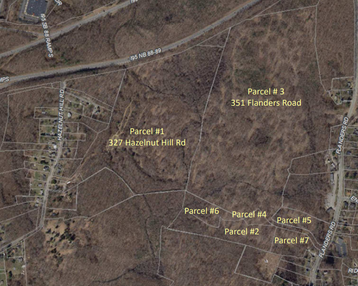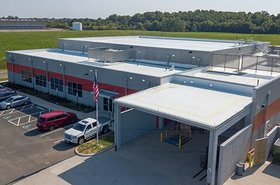A landowner in Groton, Connecticut, is suing the town after it rejected a data center development proposal on the site.
The site in question sits on Hazelnut Hill and Flanders roads and is owned by 327-449 Hazelnut LLC. The company had an agreement with data center developer NE Edge to sell the plot for $5.25 million so that the latter could build a data center.
That proposal was rejected by the local council, and now the principal of 327-449 Hazelnut LLC, John Holstein, is seeking more than $2m in damages from the town, reports The Day.
State law in Connecticut means that data center developers must sign a host agreement with the town before pursuing land use approvals. In March 2022, Groton's town council voted 5-1 against any such agreement.
Several residents and officials had expressed concerns about the project. At the time, Councillor Aundré Bumgardner said he "heard a resounding no from the public" and made a motion that added the verbiage “with prejudice," which he said meant “indefinitely” or “for good.”
NE Edge claims to have proposed concessions to help sweeten the deal for Groton, including offering to pay $250,000 each to two local high schools annually for 25 years, donate 50 to 70 acres of land to the town, build a dog park and playground, and extend water and sewer infrastructure along Flanders Road. But the local authority never scheduled a meeting to discuss the offers, according to 327-449 Hazelnut LLC's attorney, Mary Mintel Miller.
The filing also states that the town did not include NE Edge in discussions, failed to engage in negotiations, and did not follow legal advice regarding a motion to discontinue negotiations. It also claims it neglected to consult the Planning and Zoning Commission regarding the land's suitability for data center development.
Without permission to place a data center on that plot, the land's value is significantly lower, and the complainant argues that the “data center would have been built on only 13 acres of the 168-acre total, and this kind of development was allowed under the zoning regulations at the time.”
Since the council refused a hosting agreement with NE Edge, it has approved regulations limiting the size of data centers to 12,500 sq ft (1,160 sqm).
NE Edge was founded in December 2021 by Thomas Quinn, former CEO of Verde LLC and later joint owner of Gotspace Data Partners. The company has proposed data center developments across Connecticut, in Groton and Bozrah, but has so far been unsuccessful. In August 2023, the company successfully purchased land in Killingly, Connecticut.
In February 2023, NE Edge was seeking a Host Municipality Agreement in Waterford, Connecticut, to develop data centers powered directly by the Millstone Nuclear Power Station in New London County. That proposal would see NE Edge developing a 300MW campus spanning 1.5 million sq ft across two two-story buildings.
While this agreement was signed, several residents have expressed concerns about the plan, covering issues such as the environmental impact, noise pollution, and traffic. Others noted that the location is known to flood which causes the plant to shut down, something which could also impact a data center at the site.
The development still needs to finalize agreements and project proposals, as well as get the boundaries of the site revised to accommodate the data centers. DCD has contacted NE Edge to see if it still expects to be ready to break ground in mid-2024.
NE Edge is named as a defendant in a $30 billion lawsuit led by Thomas Quinn's former business partner at GotSpace, Nicholas Fiorillo. That lawsuit was filed in January 2023, though has seen little progress since then. Immediately following the filing, the District Court of Massachusetts noted that Fiorillo had failed to pay the $350 filing fee and $50 administrative fee.
By October 2023, Judge Patricia Sullivan stated that, thus far, "none of the defendants named in this case have yet been served and appeared." As well as NE Edge representatives, the lawsuit lists over seventy entities and people including Apple, T-Mobile, the City of Boston, and its officials and agencies. Sullivan additionally noted that: "As far as the pleadings reveal, none of these [companies or people] are implicated in any way in the facts presented in the state court case."







